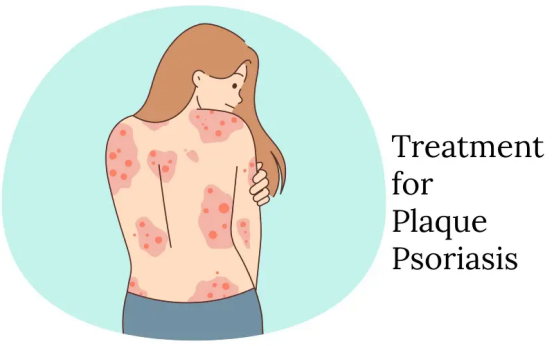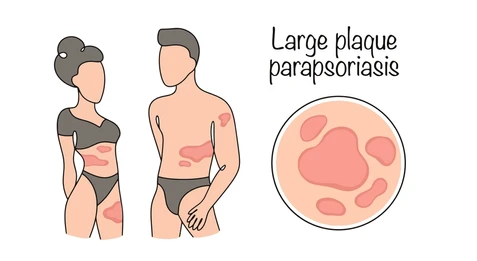Understanding Plaque Psoriasis: Symptoms, Treatment, and Impact on Life
Plaque psoriasis is a chronic autoimmune condition that affects millions of people worldwide. Characterized by red, scaly patches on the skin, this condition can significantly impact an individual's quality of life. In this , we will delve into the symptoms, causes, and treatments of plaque psoriasis, as well as the importance of managing the condition and the role of diet in its management.
What is Plaque Psoriasis?
Plaque psoriasis is the most common form of psoriasis, accounting for approximately 80-90% of all cases. It occurs when the immune system mistakenly attacks healthy skin cells, leading to an accelerated growth cycle. This results in the formation of thick, raised patches of skin covered with silvery-white scales. These plaques can appear anywhere on the body but are most commonly found on the elbows, knees, scalp, and lower back.
Symptoms of Plaque Psoriasis
The symptoms of plaque psoriasis can vary from person to person, but common signs include:
- Red patches of skin: These patches are often covered with thick, silvery scales.
- Dry, cracked skin: The affected areas may become dry and prone to bleeding.
- Itching and burning: Many individuals experience discomfort, which can lead to scratching and further irritation.
- Thickened, pitted, or ridged nails: Nail changes can occur in some individuals with psoriasis.
- Swollen and stiff joints: In some cases, psoriasis can be associated with psoriatic arthritis, leading to joint pain and inflammation.
Causes of Plaque Psoriasis
While the exact cause of plaque psoriasis is not fully understood, it is believed to be a combination of genetic, environmental, and immune system factors. Some potential triggers include:
- Genetics: A family history of psoriasis increases the likelihood of developing the condition.
- Infections: Certain infections, such as strep throat, can trigger or exacerbate psoriasis.
- Stress: High levels of stress can lead to flare-ups.
- Skin injuries: Cuts, scrapes, or sunburns can trigger the onset of psoriasis.
- Weather: Cold, dry weather can worsen symptoms, while sunlight may improve them for some individuals.
The Importance of Treatment
Ignoring plaque psoriasis can lead to a range of complications and a significant impact on an individual's life. Untreated psoriasis can result in:
- Physical discomfort: The itching and pain associated with psoriasis can interfere with daily activities.
- Emotional distress: The visible nature of the condition can lead to feelings of embarrassment, anxiety, and depression.
- Increased risk of comorbidities: Individuals with psoriasis are at a higher risk for other health issues, including cardiovascular disease, diabetes, and obesity.
Therefore, seeking treatment is crucial for managing symptoms and improving overall well-being.
Treatment Options for Plaque Psoriasis
There are several treatment options available for plaque psoriasis, and the choice of treatment often depends on the severity of the condition and individual preferences. Common treatment options include:
1. Topical Treatments: These are applied directly to the skin and include corticosteroids, vitamin D analogs, retinoids, and calcineurin inhibitors. They are often the first line of defense for mild to moderate psoriasis.
2. Phototherapy: This involves exposing the skin to ultraviolet light under medical supervision. Phototherapy can be effective for moderate to severe cases and is often used in conjunction with topical treatments.
3. Systemic Medications: For more severe cases, systemic medications that affect the entire body may be prescribed. These include oral medications like methotrexate, cyclosporine, and biologics that target specific parts of the immune system.
4. Lifestyle Modifications: Incorporating healthy lifestyle changes, such as stress management techniques, regular exercise, and a balanced diet, can also play a significant role in managing symptoms.
Recommended Foods for Managing Plaque Psoriasis
Diet can have a profound impact on inflammation and overall health. While there is no specific "psoriasis diet," certain foods may help reduce inflammation and improve skin health. Here are some dietary recommendations:
- Fruits and Vegetables: Rich in antioxidants, vitamins, and minerals, fruits and vegetables can help combat inflammation. Aim for a variety of colors to ensure a wide range of nutrients.
- Healthy Fats: Incorporate sources of omega-3 fatty acids, such as fatty fish (salmon, mackerel), walnuts, and flaxseeds. These fats have anti-inflammatory properties.
- Whole Grains: Opt for whole grains like brown rice, quinoa, and whole wheat bread, which can help maintain stable blood sugar levels and reduce inflammation.
- Lean Proteins: Choose lean sources of protein, such as chicken, turkey, beans, and legumes, to support overall health without contributing to inflammation.
- Hydration: Staying well-hydrated is essential for skin health. Aim to drink plenty of water throughout the day.
Conclusion
Understanding plaque psoriasis is crucial for effective management and treatment. By recognizing the symptoms, causes, and available treatment options, individuals can take proactive steps to improve their quality of life. Additionally, adopting a healthy diet can play a significant role in managing inflammation and supporting overall well-being. If you suspect you have plaque psoriasis or are struggling with its management, consult a healthcare professional for personalized advice and treatment options. Remember, you are not alone in this journey, and effective management is within reach.

